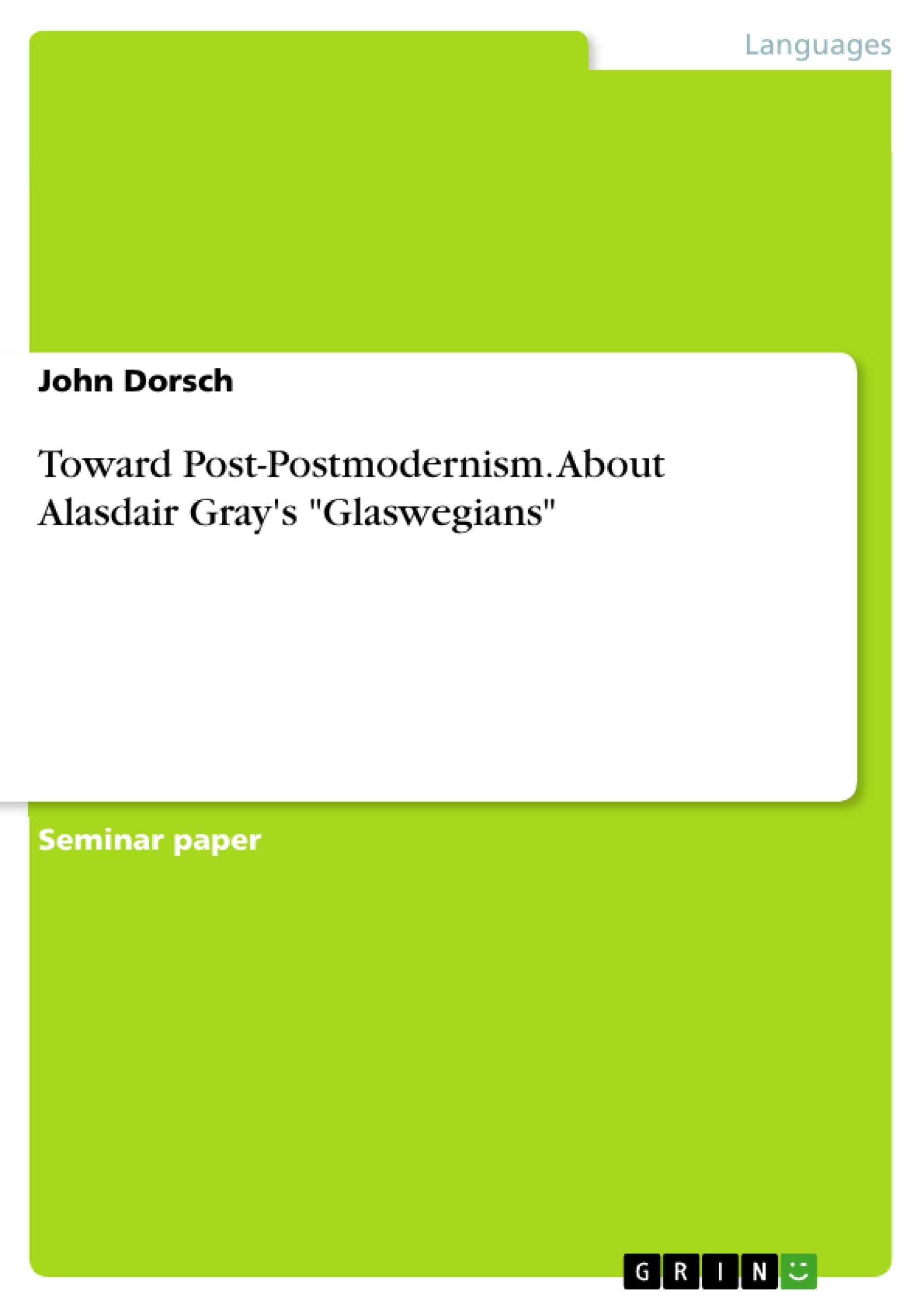Despite often being described as the prototypical author of postmodern literature, in a letter to Dietmar Böhnke, Alasdair Gray has this to say about postmodernism, ”Post modernism seems the creation of scholars acquiring a territory to lecture upon.” - thus ridiculing his status as a postmodern writer.
In this paper, I'll work closely with Gray's short story collection, Glaswegians, and will interpret whether it is modern, postmodern, or post-postmodern. To assist my determination, I will investigate the history of the postmodern, dividing it into its philosophical and cultural vocabularies. The result of my investigation and interpretation is that Glaswegians is a post-postmodern work because, despite the play with what could be called a postmodern elements, it provides the reader with answers to postmodern dilemmas and points to something “outside the text”.
Inhaltsverzeichnis (Table of Contents)
- Postmodern Thought
- Postmodern Culture
- Gray's Glaswegians
- Bibliography
Zielsetzung und Themenschwerpunkte (Objectives and Key Themes)
The paper aims to explore the postmodern elements in Alasdair Gray's short story collection, Glaswegians, and determine whether the work can be classified as modern, postmodern, or post-postmodern. The author will investigate the history of postmodernism, encompassing both its philosophical and cultural vocabularies, to assist in this determination.
- The history and development of postmodern thought
- The influence of philosophers such as Heidegger, Derrida, and Rorty on postmodernism
- The relationship between postmodernism and cultural shifts and anxieties
- The concept of "post-postmodernism" and its potential to address postmodern dilemmas
- The potential for literature, specifically Gray's Glaswegians, to offer answers to postmodern questions
Zusammenfassung der Kapitel (Chapter Summaries)
- Chapter 1: Postmodern Thought: This chapter examines the origins and evolution of postmodern thought, tracing its roots back to the philosophical ideas of Heidegger and his predecessors. The author explores the central themes of postmodernism, such as the rejection of metaphysics, the emphasis on interpretation and relativity of truth, and the challenge to the concept of a stable meaning or self.
- Chapter 2: Postmodern Culture: This chapter explores the cultural manifestations of postmodernism, delving into the ways in which the philosophical ideas discussed in Chapter 1 have impacted art, literature, and society. It examines the role of postmodernism in challenging traditional notions of identity, power structures, and the relationship between language and reality.
- Chapter 3: Gray's Glaswegians: This chapter focuses on Alasdair Gray's short story collection, Glaswegians, and analyzes the work through the lens of postmodern thought and cultural trends. It explores how Gray's stories engage with themes of postmodernism and whether they offer a response or a critique to these ideas.
Schlüsselwörter (Keywords)
Key concepts explored in this paper include postmodernism, post-postmodernism, philosophy, culture, literature, Alasdair Gray, Glaswegians, Heidegger, Derrida, Rorty, interpretation, truth, meaning, language, reality, identity, power structures.
Frequently Asked Questions
Is Alasdair Gray a postmodern writer?
While often labeled as such, Gray himself ridiculed the term. This paper argues that his work 'Glaswegians' is actually post-postmodern.
What defines 'post-postmodernism' in this context?
It is characterized by moving beyond postmodern dilemmas (like relativism) and providing answers or pointing to a reality 'outside the text'.
Which philosophers influenced postmodern thought?
The paper discusses the influence of Heidegger (rejection of metaphysics), Derrida (deconstruction), and Rorty (pragmatism/relativity of truth).
What is the central theme of 'Glaswegians'?
The collection engages with cultural shifts, identity, and the relationship between language and reality in the specific context of Glasgow.
How does the paper distinguish between postmodern thought and culture?
Postmodern thought focuses on philosophical roots, while postmodern culture examines how these ideas impact art, society, and identity.
- Quote paper
- John Dorsch (Author), 2014, Toward Post-Postmodernism. About Alasdair Gray's "Glaswegians", Munich, GRIN Verlag, https://www.grin.com/document/412281



